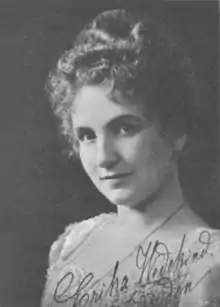Erika Wedekind
Erika Wedekind, complete named Frida Marianne Erica Wedekind, also Erika Oschwald, (13 November 1868 – 10 October 1944) was a German operatic soprano. She came from the Wedekind zur Horst family.[1] Her brothers were the writers Frank Wedekind and Donald Wedekind.[2] She was married since 1898 to the Kgl. Privy Councillor Walther Oschwald.[3]

Life and career
Born in Hanover, Wedekind grew up at Lenzburg Castle in the Swiss canton of Aargau,[4] which had been purchased by her father – a general practitioner. Although she was celebrated by the local press for her successful stage performances as a young girl in Lenzburg and Aarau, her father refused to allow her to train as a singer and forced her to train as a teacher. It was only after his death that she graduated from the Dresdner Konservatorium from 1891 to 1894, initially with Gustav Scharfe (until his death in 1892)[5] and studied singing with the famous soprano and music teacher Aglaja Orgeni.[6]
Wedekind made her debut in 1894 as Frau Fluth in The Merry Wives of Windsor by Otto Nicolai[7] and in the same year received her first engagement at the Dresdner Hofoper, where she was a celebrated coloratura soprano until 1909.[4] Due to her great success, which also took her to international stages, she was given the official title of "Royal Saxon Kammersängerin".[7]
Wedekind took part in the world premiere of the opera Die Schönen von Fogaras by Alfred Grünfeld, as well as in the Dresden premiere of Engelbert Humperdinck's Hänsel und Gretel. After she left the Dresden Court Opera in the same year, performances as a concert singer predominantly followed. Her brothers, the writers Donald and Frank Wedekind, who had no professional success at the time, received occasional financial support from her sister.
Wedekind was one of the first female coloratura sopranos in Germany and an outstanding representative of her field. She gave more than a thousand performances in Germany, Prague, Moscow, St Petersburg, Budapest, Stockholm, Paris and London before becoming an internationally sought-after singing teacher between 1914 and 1930. From 1930 she lived in seclusion in Switzerland, where she died in Zurich in 1944 at the age of 75.
Awards
In 1909 she was awarded the civic gold medal Bene merentibus by the Ministry of the Royal House of Saxony for her achievements.[8] She held the Orden für Kunst und Wissenschaft of the Grand Duchy of Mecklenburg-Strelitz.[9]
- Königlich-sächsische Kammersängerin in Dresden[2]
- Grossherzoglich-hessische Kammersängerin in Wiesbaden[2]
Further reading
- Ludwig Eisenberg: Erika Wedekind. In Großes biographisches Lexikon der deutschen Bühne im XIX. Jahrhundert p. 1097. Paul List, Leipzig 1903.
- Anatol Regnier: Frank Wedekind: Eine Männertragödie. Knaus, Munich 2008, ISBN 978-3-8135-0255-8.
References
- Niggli, A. "Erika Wedekind, Die Schweiz : schweizerische illustrierte Zeitschrift (E-Periodica)". ETH-Bibliothek Zürich (in German). Retrieved 2 January 2021.
- Suter, Paul (2005). "Erika Wedekind". Theaterlexikon Schweiz. Vol. 3. Zürich: Chronos. pp. 2055–2056. ISBN 9783034007153. Retrieved 2 January 2021.
- Einstein, Alfred (1929). "Wedekind, Erika". Hugo Riemanns Musik-Lexikon.
- Kutsch, K. J.; Riemens, Leo (2012). Wedekind, Erika. ISBN 978-3-59-844088-5.
{{cite book}}:|work=ignored (help) - Report on the graduation ceremony at the Dresden Conservatory, spring 1892: Erika Wedekind received a verbal commendation and Gustav Scharfe (Classe Scharfe) was given as the teacher. Neue Zeitschrift für Musik, 1892, volume 59, volume 88, (p.221 is available for free viewing and download at the Internet Archive).
- Focht, Josef (ed.). "Wedekind, Erika". Bayerisches Musiker-Lexikon Online. Retrieved 2 January 2021.
- Elizabeth Forbes (2001). "Wedekind, Erika". Grove Music Online (8th ed.). Oxford University Press. ISBN 978-1-56159-263-0. Retrieved 2 January 2020.
- Sächsisches Staatsarchiv, Archivalie 10711, Sign. Loc. 52 N.° 03, retrieved 1 January 2021.
- Erika Wedekind sings chacun le sait (in German) from La Fille du regiment 1907
External links
- Literature by and about Erika Wedekind in the German National Library catalogue
- Erika Wedekind discography at Discogs